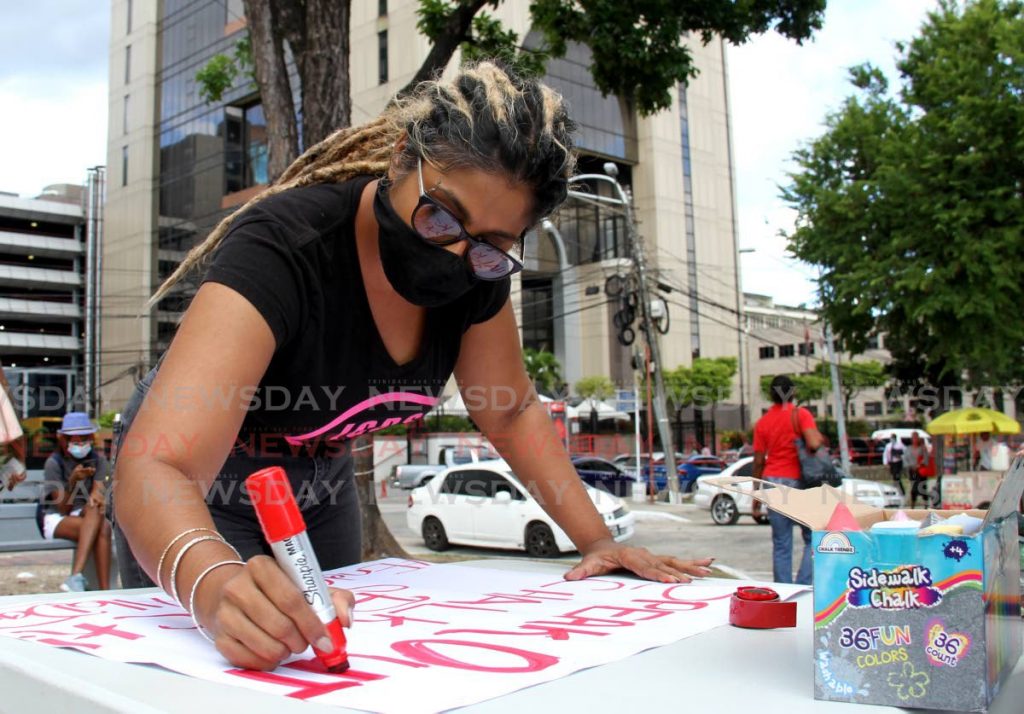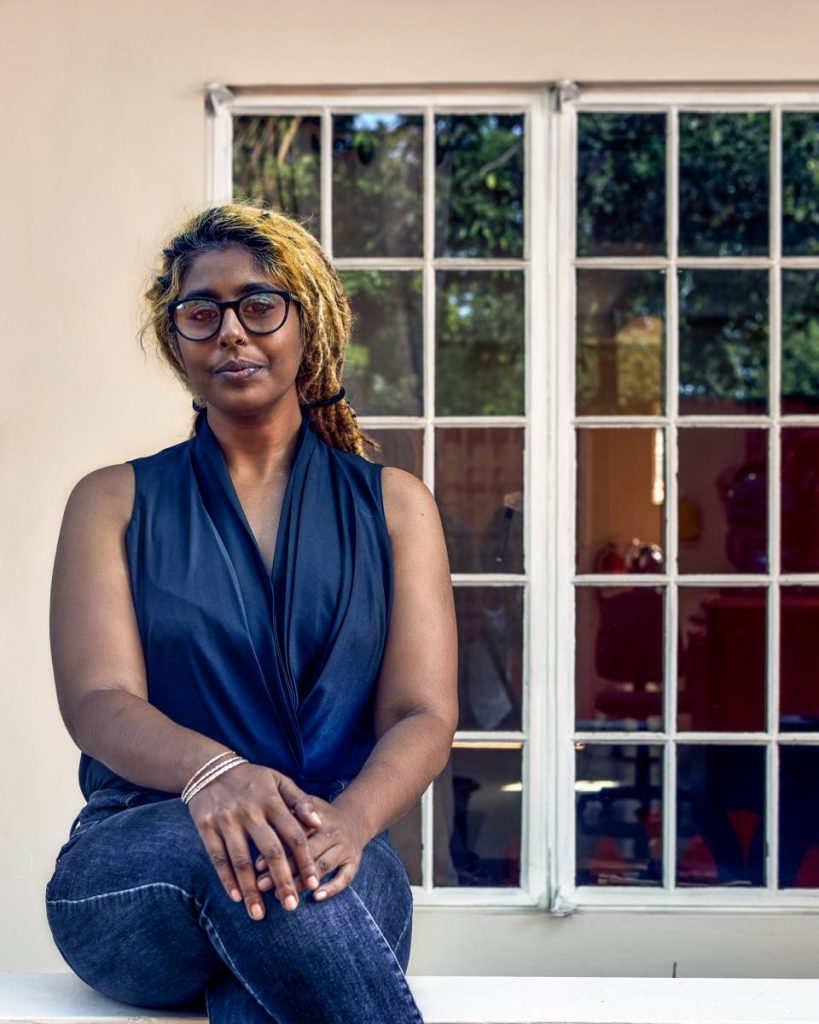Gender activist: Women must stand by their truth

For as long as she can remember, Renuka Anandjit has always questioned the status quo and has been willing to give of her time and talents to a variety of causes. And although she is only temporarily living in TT while pursuing a doctorate in interdisciplinary gender studies, the 32-year-old research assistant at the Institute for Gender and Development Studies (IDGS) at the UWI, St Augustine has now found herself in the midst of what has become a national call to end violence against women, and believes she can be instrumental in beginning to change the gender-based violence (GBV) narrative.
“The intention is to push behaviour change and try to have conversations. It’s important to have conversations because sometimes people view situations as black and white. It’s not always that clear-cut,” she told Newsday.
She said hopefully, as these conversations take place there will be more accountability and people will be able to see the changes in the long term. “That’s the thing about activism. You may not see the whole change in your lifetime. You may see incremental changes and you know it’s a long haul you’re investing for. You’re investing your efforts in the long-term… Public policy takes time. Behaviour change takes time.”
Anandjit is from Guyana and said even as a teenager she was always challenging things with which she was not in agreement, and believes that was where she recognised her feminist tendencies. “Whether in small groups or in classrooms, I would always be the devil’s advocate, always questioning things like inequality,” she told Newsday. And as cliche as it may sound, she encourages women to stand in their truth and be resilient. “As women we experience and have to go through a lot. Just living your life is a push against the norm. You will always have pushback. Know what’s right for you and stick with it. It will pay off.” She said as a young adult she was always doing some sort of social work and volunteering with non-governmental organisations (NGOs) in a variety of areas. “I love volunteering. I do enjoy lending my energy and support to different causes.”
Anandjit has been in TT since 2016 when she began a master’s programme in gender and development studies at IDGS. “I’m from rural area just outside the capital city in Guyana. I did my undergraduate degree in social work from the University of Guyana and a post graduate diploma in development studies.” Career-wise, she said, she has spent most of it working in the non-profit sector and even did a two-year stint with the Peace Corp.

Her work as a research assistant involves providing support to IDGS head Dr Gabrielle Hosein. It has opened many activism doors for her, including the opportunity to co-ordinate IDGS Ignite, a student group that was formed in 2016.
“We try to do more popular actions (interactive outreach activities to promote particular issues) around campus and also on social media. And we also try to do different forms of community outreach where we go into schools and we talk to students about GBV and sexual reproductive health… So what we’re really trying to do is try to show that a lot of the social issues are gendered issues, and we operate under a feminist framework which really advances notions of equality and gender justice, the real kind of overarching frame of our work.” Another one of the projects on which she works is the Catcalls of UWI project, which was developed by two students and has over 2,000 followers on Instagram. It was inspired by Catcalls of NYC.
“Catcalls is project focussed on street harassment in GBV. A lot of times people don’t recognise that a lot of these issues happening on the street happens on campus. But campus is a microcosm of the nation.
“We started the project and the response was overwhelming. There were so many stories, even from boys. Sexual harassment, catcalling, rape, violence. So we’ve managed to bring awareness about it.”
She said many people don’t see catcalling as GBV or as a threat. “But we’re trying to give students information to show that gender is connected to everything, and that you can use feminism to inform your work because what we’re trying to do is really break down barriers and divisions to really create a gender-just world where we are free from oppressions. Where everyone has the same access. It’s not the world we live in right now but it’s the world we’re moving toward… a world where everybody contributes differently but we’re still on equal ground.”
Anandjit said GBV against men, while seemingly not as prevalent, is also not okay and also needs to be addressed. “Violence is violence, and a lot of men are abused and they don’t speak up because of the standards we hold them to. Men are not supposed to cry or show emotion. They are supposed to ‘man up’. All of that is a part of toxic masculinity because when we don’t create safe spaces for men, they reproduce those harmful norms based on their experiences…These are just ways in which we create more victims because men are victims of patriarchy too. And that’s the beauty of feminism. It’s for everybody. When we eliminate those oppressions and get rid of the hierarchies we’re helping each other. Men don’t have to suffer because of this type of toxic masculinity and they can play more supportive roles. They can be more vulnerable and really open up more about their struggles.”
Anandjit grew up in a Hindu home and her career choice, decision to embrace feminism and become agnostic went against many of the principles of that religion. But these decisions did not meet with much resistance from her family.
“My family is extremely supportive of my work. I think initially my mom was not. She was like ‘find a more formal profession. Do something in business.’ Initially I wanted to be a lawyer, and she wanted me to revisit the idea. But that’s not where my interest lies and that’s not where my passion is. She got over that really quickly,” she chuckled heartily. But although she is agnostic there are some things about Hinduism that are ingrained in her and bring her comfort. She still recites the Gayatri mantra and wants to be cremated when she dies.
“I told mom, when I die, I want to be put in the plainest box possible, in a white cotton shalwar and be burn me as quickly as possible. I want to be cremated. That’s one of the things I’ve held on to as a Hindu tradition. I don’t actively participate in religion, but I’ll do it for my mom if she wants me to do it. I’ll compromise.” But there is one thing she absolutely refuses to compromise on. “Of course since I came to Trinidad there is always the ‘chicken curry, curry chicken’ banter. I am still and will always be a ‘chicken curry’ girl. But I can appreciate a ‘curry chicken’,” she said with a smile.
Her work at the IDGS can sometimes be tedious, but she said the fact that she also assists Dr Hosein with the teaching allows her to learn exciting lessons of her own. “I get to interact with students of different ages and from different backgrounds. It gives you a different perspective and cross cultural learning.” And there is still a lot to learn about TT. “Trinidad is a lot more than pastelles and Carnival. I love Trinidad and I’ve had a very positive experience in terms of building relationships and my own personal and professional advancements. The only thing I don’t like about it is the general sense of safety that is absent.”
She said a violent TT is the only one she knows and had a lot of reservations about moving here because of reports of high levels of violence and crime. “But I manage to navigate well. I have an excellent support system here at IGDS and from friendships that I would have developed here.” She said being an Indian woman in TT is a little bit different to being an Indian woman in Guyana.
“We have similar cultures but I think for me it’s just like different cultural nuances. A little bit freeing in some instances and sometimes you’re a little bit policed in some instances. I think Guyana is a little more reserved than Trinidad,” she said, using the “strange looks” she would get in Guyana because of her dreadlocks as an example. “Back home somebody once said to me, ‘fix your hair, you’re an Indian girl.’”
Anandjit will be resident in TT for three more years and said her ideal career trajectory after that will be working with an NGO. “Maybe working with an international organisation, still very involved in the feminist movement, still very involved in community work and activism because I feel like that’s where the real work happens. You know you have to do underground work as well as technical work. It’s multi-layered.
“Going into communities and having conversations with men about the impact of their own attitudes and actions. Doing technical advocacy work while doing community work. I’d like to find a place where I can merge that.”


Comments
"Gender activist: Women must stand by their truth"